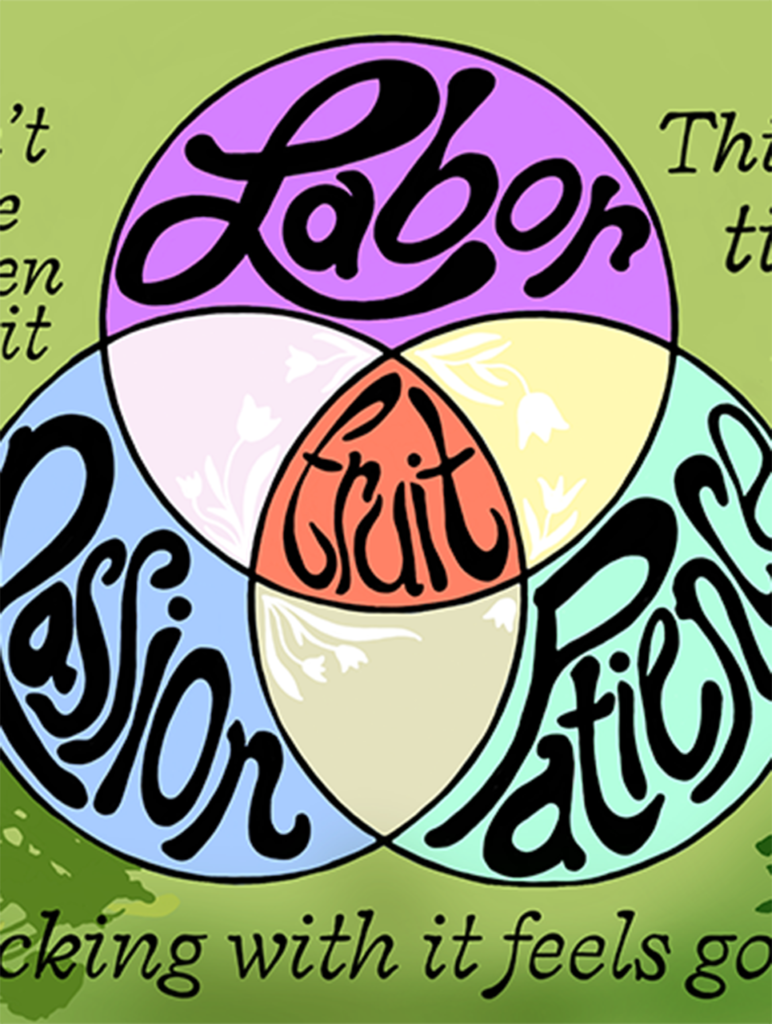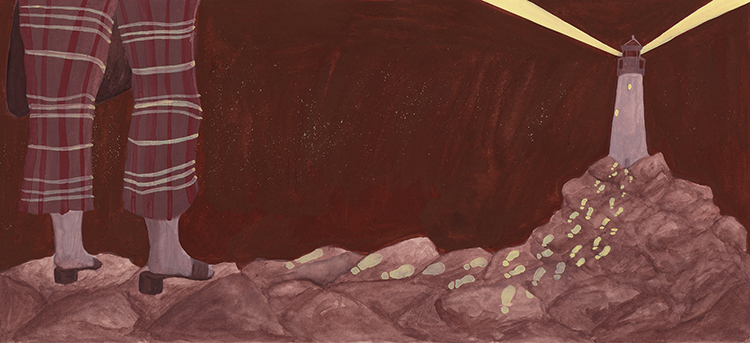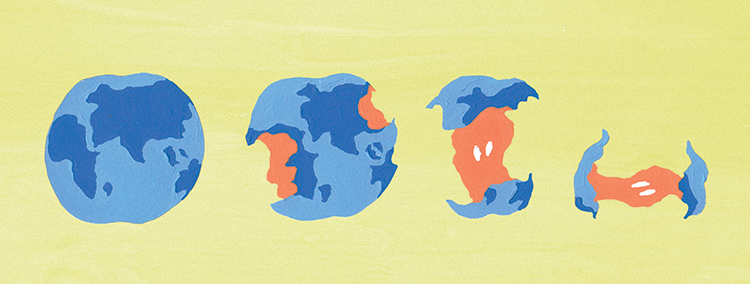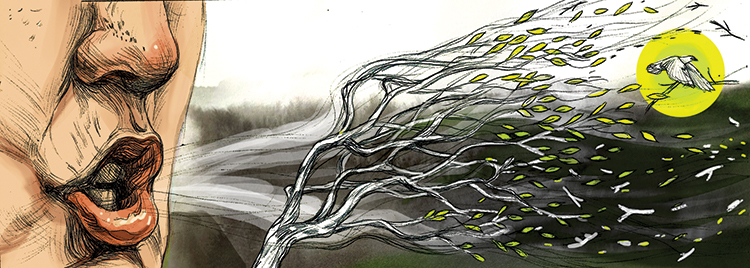Illustration by James Olstein
Blinded by Science
by Jerry Silberman
Question: Is sustainability a religious value?
The Right Question: Can you have faith without respecting the world?
“If then you obey the commandments that I enjoin upon you this day… I will grant the rain for your land in season, the early rain and the late. You shall gather in your new grain, and wine, and oil. I will also provide grass in the fields for your cattle, and thus you shall eat your fill. Take care not to be lured away to serve other gods… for the Lord’s anger will flare up against you, and He will shut up the skies so that there will be no rain and the ground will not yield its produce… and you will perish.”
—taken from Deuteronomy, 11: 13–17, Jewish Publication Society translation
Religious belief arises from the effort to understand and interpret the world, and to find our place within it. Trying to explain why the world is so capricious and at times gratuitously dangerous has led to belief systems as disparate as Christianity and Buddhism.
It’s important to note that all the major religions, which among them claim billions of believers, arose at a point in human history where the world appeared not only infinite in resources but beyond our ability to influence it.
In the above verses, excerpted from a biblical text recited at least daily by observant Jews, you can see the extent to which people felt at the mercy of forces larger than themselves.
The unvarnished goal of prayer, from its earliest traces, was to gain influence over processes that were mysterious to us, and yet central to our survival: rain for the crops and food for the livestock. It captures one way of understanding our relationship with the world on which we are utterly dependent, but similar sentiments are available in any tradition, even those without the concept of a Supreme Being. Whether read metaphorically or literally, they have a powerful message today that would require us to reimagine our place in the world.
Trying to explain the world has too often led to separating ourselves from it, but the real challenge to faith arose with the development of science and the competing belief that we could know the world. It has led us to a place that those living centuries ago never could have fathomed: the idea that we could know everything about how the world works, and therefore change it and make it bend to our wishes.
We have gone a step further in our current time, believing that we can bend the rules of the universe in service to our goals and aspirations without consideration for the rest of the community of life, or, from a scientific perspective, the biosphere upon which our lives depend. With all of our modern conveniences and infrastructure, particularly in urban environments, we have made it easy for many people to forget that we do not exist apart from nature.
In our collective ignorance of the limits of the world in ages past, we certainly caused extensive changes or damage to biomes and ecological systems—such as the extinction of many large animals in the western hemisphere and the deforestation of large areas of the Middle East. Destruction and alteration of the world around us is not a thoroughly modern phenomenon.
The rise of the faith in science, however, has allowed a much more vast disturbance in our biosphere than our past damage, even with the knowledge of the damage we are causing. Our sense of place in the world has been thoroughly dislocated, and overrated, even in the face of clear evidence that we do not control our environment.
Beliefs and faith both require—at the very least—separation from the scientific method. While we may attempt to justify things we believe or in which we have faith by scientific proof, true faith and true belief come before and exist independent of any “rational” proof. It’s how we are built.
In the throes of our modern hubris, we are only temporarily humbled, for instance, by the path of a storm that destroys broad swaths of our infrastructure, or destroys whole ways of life. But we rebuild, and we hope—have faith—in a different result.
I have faith that the world is too complicated for us to ever fully understand, let alone control. I am in awe of the beauty and complexity of the world of which I am a part. Therefore I am obligated to take my place modestly within that world, learning from it, not attempting to teach it.
While I don’t believe there is an omniscient or omnipotent supreme consciousness guiding the world, I am quite sure that the subtext of self-serving science that implies those powers are within human reach is fatal arrogance.
Without the wisdom to recognize that there are parts of the world forever beyond our understanding and control, we will not be able to successfully adapt our ways to survive the processes of change we have, wittingly or unwittingly, launched in the world.
Jerry Silberman is a cranky environmentalist and union negotiator who likes to ask the right question and is no stranger to compromise.








